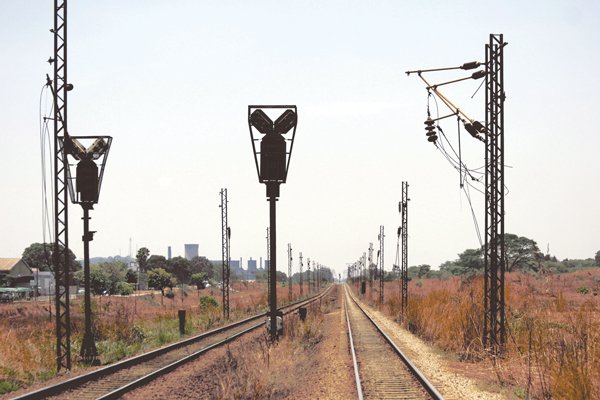THE National Railways of Zimbabwe (NRZ) US$400 million recapitalisation deal will be discussed during the Zimbabwe-South Africa bi-national commission meetings when South African President Cyril Ramaphosa visits Harare this coming Tuesday, amid underlying squabbles.
By Tinashe Kairiza/Nyasha Chingono
Informed Ministry of Transport and NRZ officials say tremendous progress has been made since the project was initiated, but there are tensions over unresolved issues. The project, which also involves South African rail utility Transnet and the Diaspora Infrastructure Development Group (DIDG), has now been accorded priority status.
DIDG has already secured indicative term sheets for funding amounting to over US$700 million from South African banks.
President Emmerson Mnangagwa and Ramaphosa, both pushing to revive and grow their economies, will co-chair the meeting between the two countries which are big trading partners and share the busiest border post in sub-Saharan Africa, Musina/Beitbridge.
South African officials are already in Harare for the bi-national commission meetings. Several engagements — including an Inter-Ministerial Preparatory Meeting — were held this week and the project loomed large in the discussions, officials said.
This came as Transport minister Joel Biggie Matiza last week secured an extension of the framework agreement for the deal implementation for six months. The framework agreement had expired in mid-February.
However, the extension is now “non-exclusive” to DIDG, which won the exclusive tender, raising new concerns.
NRZ officials see this as an attempt by self-interested local parties plotting to sabotage the deal to bring their preferred partners into the project through the backdoor, as some have been trying to do despite Mnangagwa having officially commissioned it while implementation is already underway.
However, Zimbabwe’s Foreign Affairs minister Sibusiso Moyo, officials said, has come out strongly supporting the project, seen as key to government’s infrastructural development and economic revival plans.
Moyo, roped in to remove bottlenecks stalling the deal, this Monday chaired some bi-national commission meetings in which the project was discussed at length.
Sources said Matiza updated the meetings. He reported progress on implementation, but his report raised queries among stakeholders who felt he was being misled by transaction and legal advisers who have emerged as stumbling blocks to implementation of the project.
Deloitte & Touche (Zimbabwe) are the transaction advisers, while DMH Commercial Law Chambers are providing legal counsel.
The Transport ministry’s legal adviser Angeline Karonga is also involved. Ministry and NRZ officials say Karonga has been sabotaging the project through legal complexities and this has raised eyebrows. The transaction and external legal advisers seem to be supporting or working with her to get the deal entangled in a legal imbroglio, sources said.
Karonga was one of the four senior public officials suspended two years ago for trying to block investigations into the abuse of State funds for the rehabilitation of rural roads at Zimbabwe National Roads Administration (Zinara).
Energy minister Joram Gumbo thwarted investigations into the matter while he was still Transport minister by muzzling the board and shielding senior ministry officials and managers involved in a multi-million dollar tender scandal.
“The NRZ-Transnet-DIDG deal has been elevated to presidential and ministerial level status in Zimbabwe and South Africa in terms of implementation and monitoring. It is seen as a showcase deal in terms of bilateral cooperation between the two countries,” a senior Transport ministry official said.
“That is why it will feature a lot in the bi-national commission meetings. However, there are some hurdles — which are mainly legal — that are arising. These concern the transaction and legal advisers who are dragging their feet and coming with convoluted explanations, while making unreasonable demands, effectively complicating the transaction.
“Matiza has been very helpful and his report to the Inter-Ministerial Preparatory Meeting on March 4 (Monday) was good, but it was misleading in some parts. First, he didn’t explain why the framework agreement had to be made non-exclusive when the deal is already being implemented on certain aspects. Why create room for problems when there have been virtually none that really matter?
“Second, the minister’s claim that the recently commissioned locomotives for NRZ came under the old NRZ-Transnet arrangement is inaccurate. It’s clear in terms of the framework agreement and other supporting documents that this was done under the NRZ-Transnet-DIDG tripartite agreement,” an insider to the deal said.
Ministry and NRZ officials said Karonga’s role as legal adviser had become untenable. The same applied to Deloitte and DMH’s Edwin Manikai whose roles have been contentious and controversial around their convoluted due diligence exercise, sources said.
“These transaction and legal advisers are not helping the project at all; they are simply throwing spanners in the works through legal intricacies and making irrational demands,” a senior NRZ official said.
“Karonga has also been undermining the NRZ board due to her proximity to the ministry.
“The current legal process must be revisited or done by a constitutional and independent organ such as the Attorney-General’s office.”
NRZ general Manager Lewis Mukwada confirmed that progress reports on the negotiations, coupled with documents from the legal and transaction advisers, were submitted to Matiza.
He, however, could not explain the influence and impact of Karonga and Manikai in the process.
“The legal team submitted their report, which we included in our submission to the minister. We did the same with the report we received from the transaction advisers. I think it is unfair to discuss names or personalities. However, the minister held a meeting with the entire NRZ board and heard their submissions on progress to date,” said Mukwada.
Transport minister Matiza professed ignorance over the bottlenecks stalling the finalisation of the NRZ revival deal.
“I am yet to receive updates on the matter,” Matiza said.
At the time of going to print, Karonga had not responded to text messages, while she was also not answering her mobile phone.
Senior partner in DMH legal practitioners Selby Hwacha told the Zimbabwe Independent that only the NRZ and Ministry of Transport were designated to comment on the lengthy deal. “Check with NRZ and Ministry of Transport. It has come to that (stage) as nobody else can speak with authority on the subject save those entities,” he said.
Moyo was also not answering his phone at the time of going to print. DIDG officials were also unavailable.
The deal, which was supposed to be finalised in February, will be discussed next week with a view to clearing outstanding issues and accelerating implementation, the sources said.
A high-level meeting held at Meikles Hotel in Harare on February 11 agreed that there was a need to clear outstanding issues and speed up the implementation of the project.
Representatives of the South African and Zimbabwean governments, South Africa rail utility Transnet officials, NRZ executives and DIDG directors attended the meeting.



